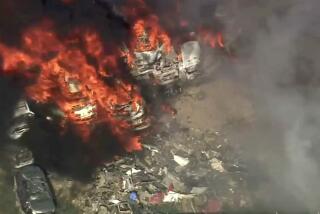L.A.’s First Tire Recycling Plant Opens
In a city where the rubber meets the road more than anywhere else, the thought of turning rubber into road had an instant appeal.
Armed with more than $1 million in low-interest state loans, Los Angeles city officials have lured a Kentucky-based recycling company to a depressed Harbor Gateway community to turn a mountain of discarded tires into something useful.
After more than a year of negotiations, Parco Recycling of California officially opened its doors Monday to the roar of giant shredding machines capable of gobbling up old tires, separating the rubber from the steel and fabric and eventually spitting out materials used to make asphalt, roofing products, playground covers, bedding for livestock and floor mats.
Nothing goes to waste. Even the steel reinforced inner loops of the tires can be fastened together on a hillside to hold back mudslides.
“We call that the ‘Malibu corset,’ ” said Alex Parker, Parco’s president, who introduced the company to a gathering of city officials and industry executives.
The plant is the county’s first tire recycling facility. The only other Southland plant is in Riverside.
“You’ve proved that abandoned tires can be turned from an eyesore into a godsend,” Mayor Richard Riordan told Parco’s representatives at the opening.
Parco built the plant with the state loans and $1.1 million in private loans. Executives say they will eventually employ 60 full-time workers.
Under pressure to do something about the escalating problem of illegal dumping and seeking an alternative to landfills, city officials began the search for a tire recycler four years ago, sending out proposals to nearly 100 companies.
Under the agreement with Parco, the city’s Bureau of Street Maintenance will collect tires at six locations throughout the city for pickup by Parco. The city will pay Parco roughly $300,000 to dispose of 2,000 to 3,000 tons of tires annually.
The amount paid by the city--about $100 a ton--is about the same amount the city pays landfills, officials said.
“No one will take tires for free,” said Steve MacDonald, a member of the mayor’s business team who put together the deal. “We get the good will of not putting tires in landfills and it help brings business to the city that wasn’t here.”
The location of the Parco facility--between South-Central Los Angeles and Wilmington--puts it in the center of an area where the city is experiencing some of its worst illegal dumping of tires, MacDonald said.
It is also in an area dominated by low-skilled, low-paying jobs. Better-paying jobs at large factories such as Goodyear and Firestone disappeared decades ago. Parco officials said their wages will be somewhere in between the two extremes.
The five-acre site Parco now calls home was an abandoned wood mill that was taken over by drug addicts. “Before we could open up we had to clean up the area, chase out some of the bad elements,” said Barry Takallou, a Parco official.
In recent years, this stretch of Los Angeles has seen more than 70 recycling centers open. Such centers, which pay money for bottles, cans and paper products, cater to an often-desperate group of scavengers, and residents have complained of crime.
However, MacDonald said Parco does not offer money for individually discarded tires, working only through contracts with government and corporations.
At Monday’s opening, company officials said they were as glad to be in Los Angeles as city officials were happy to have them.
Parco treasurer Lynn Case said the company’s hometown in Maysville, Ky., was not as open to the idea of shredding tires to make asphalt.
“In Kentucky if we grind up tires, all we have is a pile of rubber,” he said.
For 63 years Parco made its money processing tobacco. In the last few years, it moved into recycling as the tobacco industry softened, Parker said.
The business of chopping and filtering tobacco plants is “a very similar process,” he said.
The city plans to collect discarded tires at the following locations: North Central Collection Yard, 452 San Fernando Road; East Valley Collection Yard, 9701 San Fernando Road; West Valley Collection Yard, 8840 Vanalden Ave.; Harbor Collection Yard, 1400 North Gaffey St.; Western Collection Yard, 11214 Exposition Boulevard; and South-Central Collection Yard, 202 W. Slauson Ave.
More to Read
Sign up for Essential California
The most important California stories and recommendations in your inbox every morning.
You may occasionally receive promotional content from the Los Angeles Times.










